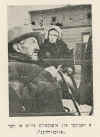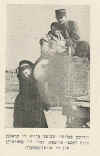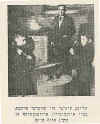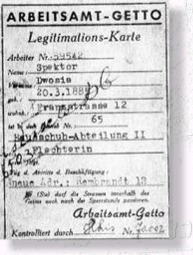The Holocaust
On This Page
|
Five-Mark banknote
used in the Lodz
ghetto
|
The Lodz Ghetto in Photos
Click on any photo for a larger view.
|

The Nazis make a spectacle of
religious Jews in Lodz. |

Soon after the Nazi invasion in
1939,
a religious Jew is humiliated by being driven through the streets of Lodz
with a sign: "We wanted the war."
|
|

A rabbi from Frankfurt am Main,
Germany, being deported from the Lodz ghetto |

Jewish policemen lift a sick
Jewish man into a wagon for deportation, 1942 |
|

Young children at hard labor in
the ghetto |

Children digging through garbage
for food, in the "year of hunger, 1942" |
|

"The death march of the
Jewish children": deportation from the Lodz ghetto to Chelmno death
camp, September 1942 |

"The last journey of the Jews
of Lodz": transport destined for Auschwitz in August, 1944, during
the final liquidation of the ghetto
|
-
Previously unpublished photos of the
Lodz ghetto, from the planned exhibit, "Do
you recognize these people, do you recognize these places?" Ghetto in Lodz,
1940-1944
-
Nazi
unit en route to Poland in September, 1939; handwritten on the side of the
train car is, "We are going to Poland to thrash the Jews."
-
Nazis
humiliate a religious Jew
-
Polish
policemen taunt a Jew
-
A
ghetto Jew covers his face
-
Deportation
of Jews from Leslau (Wloclawek) to the Lodz ghetto, 6 October 1939
-
Mordechai
Chaim Rumkowski, head of the Judenrat, October 1939 to August 1944,
at
a public speech and
officiating
at a wedding
-
More
photos of Rumkowski from the Ghetto Fighter's Museum archive
-
Rumkowski's
Chanukah lamp from the Lodz ghetto
-
President
of Lodz decrees Jews must wear Jewish star on 14 November 1939
and
man
wearing star badge
-
Hans
Biebow, Nazi administrator of the ghetto, 1940-1944
and photo
2
-
Ghetto
guarded by armed Germans
-
Jewish
policemen in the ghetto
-
164,000 Lodz Jews
forcibly moved to the Baluty slum in March and April 1940, to be sealed
off on 1 May 1940:
photo
1,
photo
2,
photo
3,
photo
4,
photo
5,
view
from rooftop
-
Mendel
Grossman (1917-1945), photographer of the Lodz ghetto
-
New
arrivals in the overcrowded Lodz ghetto, October 1940
-
Residents
crossing the street between two parts of the ghetto, ca. 1940-1941
-
A
footbridge over Zgierska Street connecting two parts of the ghetto, ca.
1941
and
second
view, 1941
-
Lodz
ghetto Documents: Ghetto ID's, passports, and other ghetto documents,
collected by survivor Frank Dobraszklanka of Golub Dobrzyn, Poland
-
Postcards
from the Lodz ghetto, collected by survivor Frank Dobraszklanka family
of Golub Dobrzyn, Poland
-
Lodz
ghetto newspaper, Geto Zeitung, 11 April 1941 edition
-
Postage
stamp of the Lodz ghetto
-
Arrival
of Jewish deportees from Germany, Luxembourg, Vienna and Prague to the
ghetto, October to November 1941
-
Identity
card of Rudolf Kohn, deported from Vienna to the ghetto in Lodz
-
Selling
goods in a ghetto market to survive, 1941,
a
makeshift marketplace and
a
peddler child seeking a livelihood
-
Execution
in the ghetto, 1941
-
Sanitation
workers in the ghetto
-
Children
playing in the ghetto
-
Two
boys in the Lodz ghetto
-
Young
Jews in the Lodz ghetto
-
Children's
parade in front of Rumkowski
and
boys
holding flags
-
Members
of the boxing club in the ghetto
-
Track
and field competition in the ghetto
-
A
small child eating from a tin plate
-
Hungry
children in the ghetto
-
Children
distributing food to public kitchens
and
man
drinking soup
-
Women
and children search for food in the ghetto rubbish dump
-
Ghetto
child crying in the street
-
Orphanage
in the ghetto
and
a
second orphanage
-
Children
employed in a ghetto workshop
-
Children
working in the clothing factory
-
Ghetto
paper factory
-
Boys
and girls sewing leather jackets in a Lodz ghetto workshop
-
A
guard addresses children in an SS labor camp in Lodz
-
Singer
sewing machine used by shoemakers in the Lodz ghetto
-
Lodz ghetto Jews
interned in the central prison before deportation:
girl
at fence,
man,
children,
parents
and children parting and
separated
family
-
Awaiting
deportation
-
Deportation
to Chelmno death camp in January 1942,
deportees
boarding train ,
Nazi
Sonderkommando supervising transport and
deportees
arriving in Chelmno after changing to open-air trains in Kolo
-
Synagogue
in Kolo where deportees were kept before being loaded into gas vans bound
for Chelmno
-
Chelmno
(four photos)
-
Children
from an orphanage boarding train to Chelmno
-
Children
in carts being deported to Chelmno
-
Lodz
Ghetto money:
five
Mark note,
fifty
Mark note,
ten
Mark coin,
coin
of the Lodz ghetto, dated 1943
-
Manuscript
of a chess game played on February 9, 1944 between noted chess player Dawid
Daniuszewski (1885?-1944?) and S. Szapiro
-
Secret
prayer from Torah, pictured with Rabbi Tzvi Hersch Michaelson
-
Gur
Hasidim in forbidden religious study
-
Piles
of phylacteries confiscated in the ghetto
-
Evacuation
order for the final liquidation of the ghetto, August 1944
-
More
photos from the archives of the Ghetto Fighters' Museum of the Holocaust
and Resistance
The Lodz Ghetto in Art and Song
-
Self
portrait, by Yitzhok (Vincent) Brauner (1887-1944), Lodz ghetto
painter in 1943
-
In
the Ghetto of Lodz-Deportation, by Szymon Szerman (1917-Holocaust)
-
Three
Children in the Lodz Ghetto,
1944, by Amos Szwarc
-
Portrait
of Mordechai Chaim Rumkowski, by M. Szwarc
-
Geto,
Yiddish song from the Lodz ghetto; composer and lyricist unknown; includes
English translation
-
Makh
Tsu Di Eygelekh, composer: David Beigelman
(1887-1945), lyricist: Yeshaya Szpiegel (1911-1969); Yiddish song written
after the composer's daughter, Eva, was deported in the huge action in the Lodz
ghetto.
-
 audio
sample of Tsigaynerlid (Real
Audio Player required for listening), composer: David Beigelman
(1887-1945), violinist, conductor, composer, and theater critic, born into a
large musical family in Lodz; wrote orchestra works and songs describing
life in the Lodz ghetto and conducted concerts; deported to Auschwitz in
1944, then sent to a slave labor camp, where he died in February, 1945; Tsigaynerlid
written as a tribute to some of the Gypsies in the Lodz ghetto attempting to
drown their sorrows in song and dance
audio
sample of Tsigaynerlid (Real
Audio Player required for listening), composer: David Beigelman
(1887-1945), violinist, conductor, composer, and theater critic, born into a
large musical family in Lodz; wrote orchestra works and songs describing
life in the Lodz ghetto and conducted concerts; deported to Auschwitz in
1944, then sent to a slave labor camp, where he died in February, 1945; Tsigaynerlid
written as a tribute to some of the Gypsies in the Lodz ghetto attempting to
drown their sorrows in song and dance
The Lodz Ghetto in Words
|
"Friday, September 4,
1942:
The
deportation of children and old people is a fact....There is
simply no word, no power, no art able to transmit the moods, the
laments, and the turmoil prevailing in the ghetto since early this
morning. To say that
today the ghetto is swimming in tears would not be mere rhetoric. It
would be simply a gross understatement, an inadequate utterance about
the things you can see and hear in the ghetto of Litzmannstadt, no
matter where you go or look or listen. There is no
house, no home, no family which is not affected by this dreadful edict.
One person has a child, another an old father, a third an old mother....All hearts are icy, all hands are wrung, all eyes
filled with despair. All faces are twisted, all heads bowed to the
ground, all blood weeps..."
"Son
of man, go out into the streets. Soak in the unconscious terror of the
new-born babies about to be slaughtered. Be strong. Keep your heart
from breaking so you'll be able to describe, carefully and clearly,
what happened in the ghetto during the first days of September in the
year one thousand, nine hundred forty-two."
- -- from Days of
Nightmare (monograph found after the war)
- Jozef Zelkowicz, 1897-1944
|
-
The
Agony of the Lodz Ghetto, 1941-1944, by Abraham J. Peck
-
Preserving
the Lodz Ghetto Archives, by Michael J. Meshenberg; how the extensive
ghetto archives were saved and preserved
-
The
Lodz Ghetto, by Jennifer Rosenberg
-
Language
Policy and Use in the Lodz Ghetto 1940-1944, by William Bostock
-
Chronicle
of the Lodz Ghetto: a detailed record of ghetto events
-
Mordechai
Chaim Rumkowski (1877-1944), head of the Judenrat
-
Hans
Biebow (1902-1947), Nazi administrator of the Lodz ghetto
-
Chelmno
-
Documents

|
The Lodz ghetto work pass of Dwosia
Spektor
|
-
The
Lodz ghetto work pass of Dwosia Spektor, by Aubrey Jacobus
-
Report
by Uebelhoer on the Establishment of the Ghetto in Lodz, 10 December 1939
-
Address
by Rumkowski to the officials of the Judenrat of Lodz, 1 February 1941
-
Telegram
from the American Embassy in Berlin on the deportation of Jews to Lodz
from Germany, 20 October 1941
-
Document
No-365: Letter from Dr. Erhard Wetzel on gassing as a "Solution to
the Jewish Question", 25 October 1941 (refers to "Litzmannstadt")
-
Rumkowski's
address at the deportation of the children, 4 September 1942: the terrible 10-day action of September 1942 when the Jews in the Lodz ghetto were forced
to give up 15,000 children, elderly and sick
-
Notes
by a Jewish observer in the ghetto following the deportation of the children,
16 September 1942
-
Letter
from Greiser, Gauleiter and Governor of the Wartheland, to Pohl concerning
the fate of the Lodz ghetto, 14 February 1944
-
Excerpts
from the trial of Adolf
Eichmann, head of the Department for Jewish Affairs in the Gestapo from 1941
to 1945; the District Court Sessions: Sessions
6, 7 & 8 , Session
20 , the
complete transcripts
Testimonies
-
January 20, 1945
-
"...Daylight blinded us, but we were immediately deliriously
happy, hugging and kissing even strangers. We ran through
Franciszkanska Street; the ghetto gate was wide open...Of the entire
population of the ghetto, more than 200,000 Jews, probably 800
remain, some of them still wearing the Star of David on their
chests. Their pale, emaciated faces are very conspicuous. The
Germans did not have time to transport even a single Jew to the
cemetery. Nine open graves remain waiting."
-
--from A Diary from the Lodz
Ghetto, by Jakub Poznanski, d. 1959
|
-
Victor Breitburg, survivor of the Lodz ghetto, and one of
"The Boys," in his own words.
 Article by Dr. Harold Bursztajn about his father
Abraham Bursztajn's experiences
during the Shoah in Lodz, describing how
two physicians, working under the shadow of death with limited resources,
were able to comfort and even promote hope and healing, and how his father
defied Rumkowski. Article by Dr. Harold Bursztajn about his father
Abraham Bursztajn's experiences
during the Shoah in Lodz, describing how
two physicians, working under the shadow of death with limited resources,
were able to comfort and even promote hope and healing, and how his father
defied Rumkowski. - Interviews from Voices
of the Holocaust, Illinois Institute of Technology. The set includes
transcriptions of original interviews conducted in 1946 in or near
Paris, and transcribed into English by Dr. David Boder.
-
Pinkus
Rosenfeld, born 1903, Lodz; former textile manufacturer in Zdunska
Wola
-
Julian
Weinberg, born 1890; former managing director of The Electric Works,
Lodz
-
Israel
Unikowski, born in Kalisz, 1928
-
Jacob
Minski, born 1907, Zurich; worked in fire brigade in the Lodz ghetto
-
Mendel
Herskovitz, born 1924, Lodz; worked in lathe shop in the Lodz ghetto
-
Adam
Krakowski, born in 1925, Lodz; survivor of the Lodz ghetto
-
Mrs.
Clara Neiman, born 1921, Saratov; convert to Judaism
- Chava Rosenfarb, survivor of the Lodz
ghetto and Bergen-Belsen, author of Der boym fun lebn (The Tree of
Life) reads
 a
poem and short story in Yiddish and English (Real
Audio Player required;
reading lasts a little over one hour).
a
poem and short story in Yiddish and English (Real
Audio Player required;
reading lasts a little over one hour).
 The
story of Roza and Godel Mydlarz, who emigrated to Australia from Lodz in
1957 The
story of Roza and Godel Mydlarz, who emigrated to Australia from Lodz in
1957-
The
Almighty and I: The Divine Spirit in the Lodz Ghetto, by child survivor
Felix Berger; other stories may also be viewed at the
'45
Aid Society Holocaust Survivors web site.

 Leo
Schneiderman,
survivor of the Lodz ghetto and Auschwitz (Real
Audio Player required for listening)
Listen to his other stories on the same site.
Leo
Schneiderman,
survivor of the Lodz ghetto and Auschwitz (Real
Audio Player required for listening)
Listen to his other stories on the same site. Yosel
Coller, survivor of the Lodz ghetto; born August 10, 1927 in Lodz
Yosel
Coller, survivor of the Lodz ghetto; born August 10, 1927 in Lodz
 Chaim
Engel, born 1916 in Brudzew, Poland;
Chaim
Engel, born 1916 in Brudzew, Poland;
 audio
testimony (Real Audio Player required for listening)
Listen to several stories told by Chaim Engel
audio
testimony (Real Audio Player required for listening)
Listen to several stories told by Chaim Engel Benjamin
Bornstein, survivor of the Lodz ghetto, Auschwitz and Hanover, Germany labor
camp
Benjamin
Bornstein, survivor of the Lodz ghetto, Auschwitz and Hanover, Germany labor
camp
 Paula
Garfinkel, survivor of the Lodz ghetto and Bergen-Belsen
Paula
Garfinkel, survivor of the Lodz ghetto and Bergen-Belsen
 Shlomo
Reich, survivor of the Lodz ghetto and Dachau
Shlomo
Reich, survivor of the Lodz ghetto and Dachau
 Lodz
ghetto survivor
Henry Joseph
of Laufersweiler, Germany, deported to the
ghetto from Luxembourg
Lodz
ghetto survivor
Henry Joseph
of Laufersweiler, Germany, deported to the
ghetto from Luxembourg
- The
Story of
Anszel Cymerman, survivor of the Lodz ghetto and Auschwitz
 Interview
with Felicia Fuksman, survivor of the Lodz ghetto and Ravensbruck
Interview
with Felicia Fuksman, survivor of the Lodz ghetto and Ravensbruck
 Online
interviews with Lodz ghetto survivors
Franka Charlupski
and
Ruth Kent (Adobe Acrobat or
Real Audio Player required for viewing or
listening)
Online
interviews with Lodz ghetto survivors
Franka Charlupski
and
Ruth Kent (Adobe Acrobat or
Real Audio Player required for viewing or
listening)
- The
Emperor of the Ghetto,
a play by Abraham Cykiert, survivor of the Lodz ghetto and Auschwitz
 The
Story of Bernard, survivor of the Lodz ghetto and
Auschwitz
The
Story of Bernard, survivor of the Lodz ghetto and
Auschwitz
 Children of the Holocaust:
Chaim
Blachman,
Lenka
Nadolna,
Natan
Abbe and
Edzia
Abbe
Children of the Holocaust:
Chaim
Blachman,
Lenka
Nadolna,
Natan
Abbe and
Edzia
Abbe
|
|